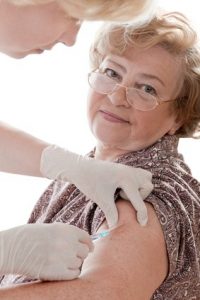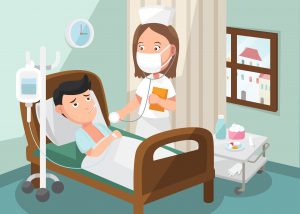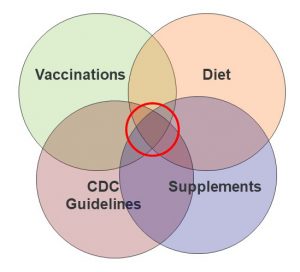The Risks Of Vaccination
 Many of you want to get vaccinated against COVID-19, but you are fearful. You have been sending me videos and posts about the risks of COVID vaccines. You have been asking, “Are the vaccines safe?” I don’t have time to respond to all of you personally, so I have decided to combine my responses into a single article in an effort to provide some scientific perspective on the controversies surrounding vaccination.
Many of you want to get vaccinated against COVID-19, but you are fearful. You have been sending me videos and posts about the risks of COVID vaccines. You have been asking, “Are the vaccines safe?” I don’t have time to respond to all of you personally, so I have decided to combine my responses into a single article in an effort to provide some scientific perspective on the controversies surrounding vaccination.
Let me start by reminding you that I am not someone who automatically endorses every vaccine. I believe every vaccine should be judged on its risk versus benefit. I have discussed this in a previous issue of “Health Tips From The Professor”. In my view, the main benefit of getting the flu shot is to protect others, especially the vulnerable with weak immune systems. Accordingly, the only time I have ever taken the flu shot was the year my granddaughter was born, and that was to protect her.
However, the original strain of COVID-19 is 3-5 times more infectious (the new variants are around 7 times more infectious) and 10 times deadlier than the flu. Even worse, many people never fully recover from COVID. This dramatically changes the risk, benefit equation.
I believe everyone has the right to decide whether they will be vaccinated. I also believe that everyone is entitled to their opinion. I am not writing this article to argue with people who believe vaccines are a bad idea. I am writing this article for those of you who want to get vaccinated but are fearful because of negative messages about vaccines on the internet or from your friends.
In addition, if too many people decline to get vaccinated, the consequences could be catastrophic. This is another powerful motivator for writing this article. I don’t want people refusing the vaccines for the wrong reasons. You deserve to know the pros and cons of vaccinations.
I apologize for the length of this post. There is a lot of negative information about vaccines on the internet. I wanted to respond to as much of it as possible. Here is what I will cover in today’s article:
- The public health argument for vaccination.
- The personal argument for vaccination.
- The risks of vaccination – A perspective.
- The claims about existing vaccines.
- The good news nobody is talking about.
- New vaccines on the horizon.
- What questions remain?
- What alternatives do we have to vaccination?
- The truth about vaccination.
Now, back to the videos and posts. Some are utter nonsense. Others are videos posted by honorable people (some of whom are doctors) who have overstated the risks and understated the benefits of the vaccines. The best analogy I have heard recently is flying in an airplane. If we were to focus on all the horrible things that can happen when a plane crashes, we would never get on an airplane again. However, the risk of a plane crashing is 1 in 10 million, so most of us have no trouble getting on airplanes to take us where we want to go.
I will start by making a science-based comparison of the benefits and risks of the Pfizer and Moderna vaccines. Then I will touch briefly on some on the other vaccines that will soon be available.
To best understand the benefits of vaccination we need to envision what a world without effective COVID vaccines would look like. It drives me crazy when I hear people dismiss the risks of COVID by saying the death rate is only around 1% (1.5% to be exact). That vastly understates the risks of COVID.
The Public Health Argument For Vaccination
 Let me start with the public health perspective:
Let me start with the public health perspective:
- For us to get the pandemic under control and have life to return to normal we need to reach herd immunity. What would that look like without vaccines?
-
- Let’s start with deaths. The best current estimate of the US population is around 340 million. According to the CDC, there have been 26 million cases of COVID-19 in the US to date. That is around 7.7% of the US population. The original estimates were that 40-60% of the population would need to be immune to reach herd immunity. That means an additional 110-178 million Americans would need to be infected with COVID-19 before we achieved herd immunity. With a death rate of 1%, that would require that an additional 1-2 million Americans die before we reached heard immunity.
And this is just a minimum estimate. The % of the population required to reach herd immunity depends on the infectivity of the virus. With the new variants that are now spreading through the US population, 70-90% of the population may need to be infected before we could achieve herd immunity. In either case, are we willing to let millions of Americans die so that we can achieve herd immunity without the vaccine?
-
- Now let’s talk about the 99% who don’t die. The best current estimates are that around 80% of people who were hospitalized with COVID and 20% of those with milder disease suffer from chronic fatigue and/or some degree of lung or heart damage after they have “recovered” from COVID. In some cases, this resolves in a few weeks, but for many it lasts for months, and for some it still has not resolved almost a year later. Are we willing to let millions of Americans suffer from chronic fatigue or worse when this could have been avoided with vaccination?
-
- Obviously, these are worst case scenarios. We have already seen 20 million Americans be vaccinated. Many more are eagerly awaiting their turn to be vaccination. However, the concern of the public health community is that unfounded fears of vaccination will prevent us from reaching herd immunity through vaccinations. That would mean that many Americans would die needlessly from COVID. And many more would suffer needlessly from chronic fatigue or worse for months after “recovering” from COVID.
In summary, the public health argument for you getting vaccinated is clear. You are protecting your fellow Americans (and perhaps your vulnerable loved ones) from dying from COVID-19 or suffering long term health consequences from COVID-19. Whether you are protecting 10’s of thousands, 100’s of thousands, or millions of Americans depends on the percent of the population that gets vaccinated.
2) What about lockdowns? Here the data are clear. Lockdowns are effective at temporarily slowing the spread of the virus, so that hospitals are not overwhelmed. But they are not effective for much else. They don’t kill off the virus. And it surges again when the lockdown is lifted. We could lurch from lockdown to lockdown until we have achieved herd immunity, but I don’t think anyone wants that.
The Personal Argument For Vaccination
- What about the benefits for you as an individual? Perhaps the best way of answering that question is to

white mask address the recent announcement that you will still need to wear a mask after you have been vaccinated because you can still catch the virus and still spread it. I have seen some of you say, “If that’s true, why bother getting vaccinated?” I am as bummed as any of you that I will still need to wear a mask and socially distance after getting vaccinated but let me put that into perspective for you.
-
- Let’s start with the science. While we often talk as if we have a single immune system, we actually have several semi-independent immune defense systems. For airborne viruses like COVID-19, our first line of defense is our upper respiratory tract. We have immune cells that line our nose, throat, and upper respiratory track that can slow or stop the viral infection. If the virus takes up residence in our upper respiratory tract, it can cause mild flu-like symptoms. Once the virus escapes the upper respiratory tract, it can invade the lower respiratory tract and our bloodstream. This is where all the bad things happen.
-
- The Pfizer and Moderna vaccines are 60% effective at preventing COVID-19 from infecting our upper respiratory tract and 95% effective at preventing COVID-19 from infecting our lower respiratory tract and bloodstream.
-
- This means after we have been vaccinated, we still have a 40% chance of being infected with COVID-19 and suffering mild flu-like symptoms. If we have been infected, we can still spread it to others. However, we have 95% protection against experiencing severe COVID-19 symptoms, being hospitalized, dying, and suffering from long term complications from COVID-19. This is the most compelling personal benefit of vaccination.
-
- Finally, I should speak to the 40% risk of being infected. That is only a concern while the virus is widely circulating in the community. When we reach herd immunity and the virus levels are low, the probability of infection will also be low.
2) There is one other personal consideration. A recent study has confirmed what we already expected, namely that there is a considerable variation in immune response at every age. However, the surprising result was the study could not find any reliable predictor for the variation in immune response. In the words of one of the authors, “If you get infected with COVID-19, there is no way of telling whether it will be a mild cold or a trip to the ICU.” There have even been reports of young, healthy athletes dying from COVID-19. This does not happen often enough for it to affect the statistics. But if it were to happen to you or someone you loved, it would be important to you.
In summary, the personal argument for you getting vaccinated is that the Pfizer and Moderna vaccines give you 95% protection from severe disease, hospitalization, death, and long-term health consequences caused by COVID-19. This protection can be important even for people who are young and healthy.
The Risks Of Vaccinations
 Now let’s turn to the risks of vaccination. The risks are real, but let’s put them into perspective.
Now let’s turn to the risks of vaccination. The risks are real, but let’s put them into perspective.
- The risks of vaccination need to be compared with the risks of attempting to reach herd immunity without vaccination that I have described above.
2) The risks of adverse events occurring after vaccination also need to be compared with the risk of those same adverse events occurring after infection with COVID-19, flu, or the common cold. This is something that has been completely ignored in most online discussions of vaccination risks. Every time something triggers our immune system, there is a small chance of it going haywire and triggering things like autoimmune responses and Bell’s palsy. It doesn’t matter if the trigger is a viral infection, a bacterial infection, or a vaccine. Simply put, you are equally likely to suffer from some of these adverse events if you get vaccinated or if you decline vaccination and become infected with COVID-19.
3) Some of the reports circulating on the internet are based on the Vaccine Adverse Effects Reporting Site (VAERS) despite the clear warning that these reports are unverified and may be inaccurate. Once the reports have been posted on VAERS, the CDC contacts the person reporting the event and obtains a complete medical history for the patient. If the patient died, the CDC obtains the death certificate and, if available, the autopsy report. They then use a sophisticated algorithm to determine whether the event was unexpected based on the patient’s age, health, and underlying diseases. Rather than using the unverified VAERS data, I have based my analysis on the CDC’s January 27 COVID-19 Safety Update which summarized the data collected from the first 20 million vaccinations.
The Claims About Existing Vaccines

Now, let’s turn to some of the claims you may have heard about the Pfizer and Moderna vaccines. There is a kernel of truth to each of the claims. However, the people sharing these claims are not sharing the full truth. As Paul Harvey used to say, they are not sharing “the rest of the story.”
- I suppose I should start by addressing the oft-repeated statements that these vaccines are not FDA approved, but have received Emergency Use Authorization instead. They are experimental. There is no data on safety. They haven’t been studied in animals. We have never had an mRNA vaccine before.
-
- In an ideal world clinical studies on the vaccines would have continued another year or two so they could have received full FDA approval. We would have found out things like how long immunity lasts and whether we could space the shots further apart. However, we don’t live in an ideal world. Thousands of Americans are dying every day. Fast action was needed. That is what Emergency Use Authorization was created for. Clinical studies are still ongoing to resolve questions like how long immunity lasts. Things like that are nice to know, but they are not essential for stopping the pandemic.
-
- They have been studied in animals. I suspect this hasn’t been discussed publicly because many people oppose animal testing.
-
- Safety was evaluated carefully in the vaccine clinical trials. No major safety issues were seen in the Pfizer and Moderna clinical trials with about 50,000 participants. With any drug or vaccine, you never know about rare side effects until millions of people have received the treatment. At this point, more than 20 million people have been vaccinated and very few unexpected side effects have been reported (more about that below). The safety of these vaccines is well established at this point.
-
- mRNA vaccines are not an untested technology. They have been in development for at least 10 years. Personally, I prefer the mRNA vaccines because they are cleaner than earlier vaccines. They have fewer components and there are, therefore, fewer things that can go wrong.
2) Now, let me address the claim that large numbers of people get sick after receiving the vaccine, and are  unable to go to work. That sounds scary but let me tell you “the rest of the story”.
unable to go to work. That sounds scary but let me tell you “the rest of the story”.
-
- Short term side effects of the Pfizer and Moderna vaccines include pain at the site of injection, fatigue, headache, generalized muscle pain, chills, fever, swelling, and joint pain, particularly after the second shot. These are common symptoms for almost any vaccine. Not everyone experiences these symptoms, and for some people the symptoms are mild. However, the symptoms are severe enough for some people that it keeps them out of work. This is the kernel of truth.
-
- However, what people spreading this claim aren’t telling you is that the symptoms are temporary. They generally clear up within 24-48 hours. And people who do have severe symptoms usually miss only a day or two of work.
The bottom line is you may feel lousy for a day or two after the shot (especially the second shot). You may miss a day or two of work. But you will recover in a day or two. You will be fine, and the temporary discomfort will be worth it because you have achieved 95% protection from COVID-19.
3) Next, let me address the claim that some people have required medical attention and hospitalization after  being vaccinated. That sounds even scarier, but here is “the rest of the story”.
being vaccinated. That sounds even scarier, but here is “the rest of the story”.
-
- What they are referring to are severe allergic reactions to the vaccine. In most cases, severe allergic reactions can be handled with an injection of epinephrine (Most people who are prone to severe allergic reactions carry an epi-pen with them at all times). However, severe allergic reactions can require medical attention and occasionally a brief visit to the hospital. Again, this is the kernel of truth, but here is “the rest of the story”.
-
- The chance of a severe allergic reaction occurring is 1 in 100,000. That is about the same as your chance of being struck by lightning.
-
- These are not random occurrences. 81% of the cases occur in people who have previously had severe allergic reactions to foods, medicines, vaccines, or insect bites, especially those people who have required medical attention or hospitalization in the past. In other words, most people know they are at risk ahead of time. If you have never had a severe allergic reaction to anything before, your chance of experiencing a severe allergic reaction to these vaccines is around 1 in a 100 thousand.
The bottom line is that if you have never experienced severe allergic response in the past, your chances of experiencing it following vaccination are slight. As a precaution vaccination sites ask you to wait for 15’ before leaving so you can be observed for allergic reactions.
If you have suffered from severe allergic reactions in the past, your chances of having a severe allergic reaction to the vaccine are greater. This could require medical attention or a brief hospitalization. My recommendation for you is to consult with your physician before signing up for the vaccine. If you and your physician decide vaccination is right for you, get your vaccination from a medical center or clinic where physicians are available should severe allergic responses arise.
The CDC has been following this side effect very carefully during the rollout of the Pfizer and Moderna vaccines. The good news is that most people fully recover within 24-48 hours. This is also a transient side effect.
4) Another claim is that the vaccine will, in effect, sterilize women taking it so that they cannot become  pregnant.
pregnant.
-
- Let’s start with the kernel of truth. Early last year, two scientists who had formerly worked for Pfizer released a sent a letter to vaccine experts across the world warning that the Pfizer vaccine could cause sterilization. That sounds super-scary, but here is the “rest of the story”.
-
- That letter was part of what is called “the scientific method”. Scientists are continually challenging existing paradigms. This constant challenging and testing of ideas is the true strength of the scientific method.
-
- Scientists understand this. When someone challenges an existing paradigm, we ask, “Is it true? What do the data show?” Here are the data.
-
-
- The Pfizer study excluded pregnant women from the study. However, 23 women became pregnant and gave birth during the study. Twelve of them were in the vaccine group and eleven in the placebo group. This is a small number, but…
-
-
-
- The mechanism proposed for the vaccine causing sterility also applies to infection with the live virus. At this point, more than 100 million people have had COVID worldwide and there has been no decrease in fertility.
-
The bottom line is that the hypothesis proposed by the former Pfizer scientists has been tested and disproved. There is no detectable risk of infertility associated with either COVID-19 exposure or the vaccines.
-
- Unfortunately, most bloggers and many medical doctors don’t fully understand the scientific method. They don’t realize that things like the letter by the former Pfizer scientists are simply hypotheses and they don’t look at existing data to see whether the hypotheses are true or false.
5) Finally, there are claims that lots of people are dying after receiving the vaccine. This is based on misuse ![]() of the VAERS database. They are ignoring the warning that the data have not been verified. If you simply refer to the unverified VAERS database, 196 people have died following the first 20 million vaccinations. It sounds scary, but here is the rest of the story.
of the VAERS database. They are ignoring the warning that the data have not been verified. If you simply refer to the unverified VAERS database, 196 people have died following the first 20 million vaccinations. It sounds scary, but here is the rest of the story.
-
- Every time one of these deaths is reported to the VAERS database, the CDC obtains the medical records and cause of death. Then they calculate whether the death was unexpected for someone with that medical condition. For example, 81% of the deaths have occurred in long term care facilities. When you read the medical records of these patients you find entries like “…in and out of hospice…” or “…has congestive heart failure and was in declining health…”
-
- In the words of the CDC, the death of these patients was expected. They called these deaths “temporally-associated coincidental events.” I would word it a bit differently. These were patients on the brink of death. Anything could push them over the edge. It just happened to be the vaccination that did it.
-
- When the CDC had completed their data analysis, they could only identify two unexpected deaths in healthy patients following vaccination. That is 1 out of 10 million – the same chance you have of dying in a crash the next time you get on a plane. When you compare that with a 1 in a hundred chance of dying and a 20% chance of having long term complications from COVID-19, the choice of getting vaccinated sounds a lot less scary.
6) I suppose I should close this section by addressing some of the videos you have shared with me of people claiming they have serious side effects from the Pfizer and Moderna vaccines. Unfortunately, these claims have not been submitted to the VAERS database, so they can be verified by the CDC. At this point they seem to be in the 1 in 10 million category, but I won’t know for sure until they have been submitted and verified. As a scientist, I deal with data, not speculation.
The Good News Nobody Is Talking About
 The good news nobody is talking about is that the Pfizer and Moderna vaccines may trigger fewer autoimmune diseases than previous vaccines.
The good news nobody is talking about is that the Pfizer and Moderna vaccines may trigger fewer autoimmune diseases than previous vaccines.
- Whenever the immune system is triggered by either viral infection or vaccines, there is a small chance it will go haywire and trigger autoimmune responses, with Bell’s palsy and Guillain-Barre syndrome being the two most common. Typically, this occurs in at the rate of about 1 in a million vaccinations, with the exception of the swine flu vaccine a few years ago when it was 1 in 100,000.
- At the 20 million mark with the Pfizer and Moderna vaccines there have been zero cases of Guillain-Barre syndrome and 4 cases of Bell’s palsy. The CDC considered the Bell’s palsy cases as coincidental given the medical history of the patients. However, even if the Bell’s palsy cases were caused by the vaccination, that would translate into a rate of 1 in 5 million vaccinations. This is about the same as your risk of developing Bell’s palsy after you have had the flu.
New Vaccines On The Horizon
Now, let me speak briefly about the Johnson & Johnson and AstraZeneca vaccines that are likely to be available in the US shortly.
- Both vaccines utilize a weakened common cold virus with the gene for the COVID-19 spike protein spliced in. This is a vaccine delivery system that has been used for decades and has a well characterized safety profile.
- The Johnson & Johnson vaccine is a single shot vaccine that is 66% effective against moderate to severe disease and 85% effective against hospitalization and death.
- The AstraZeneca vaccine requires two shots for maximum effectiveness. Unlike the Pfizer and Moderna vaccines, clinical trials have determined the optimal time (3 months) between the first and second dose. The AstraZeneca vaccine is 76% effective after the first dose and 82% effective after the second dose.
In summary, both vaccines are slightly less effective than the Pfizer and Moderna vaccines. Their safety appears to be comparable to the Pfizer and Moderna vaccines, but we will know much more about their safety after the first 10 or 20 million doses have been administered in the US.
What Questions Remain?
 What about the future? There are three big question marks at present.
What about the future? There are three big question marks at present.
- Will the residual effects of COVID-19 (chronic fatigue, loss of heart and lung function) resolve or are they permanent? That is a scary thought, but we won’t really know the answer to this question for another year or two.
2) How long will vaccine protection last? You have been hearing that immune protection may only last a few months. If that were true, it would be very discouraging. I could understand you thinking, “Why bother?” However, once again we need to look at “the rest of the story”.
-
- If we just look at levels of circulating antibodies, there is a great deal of individual variation. In some individuals, circulating antibodies disappear in a couple of months. For others, they last much longer. If circulating antibodies were the sole measure of our resistance to infection from COVID-19, it would appear the immune protection from vaccinations is short lived.
-
- However, both the Pfizer and Moderna vaccines create memory cells as well as circulating antibodies. Memory cells reside in the bone marrow and retain the blueprint for making more antibody-producing cells if the virus ever reappears. They are responsible for long-term immunity. For example, many of you may remember that a few years ago, a new variant of the flu virus appeared that hit young people much harder than people over 50. The explanation we were given at the time was that the new variant of the virus was similar to a flu virus that had widely circulated 30 years earlier. We had retained significant immunity to the previous virus, and it protected us from the new virus as well.
-
- Because of memory cells, I am optimistic that we will retain significant immunity to COVID-19 even after circulating antibody levels have disappeared. But we won’t know for sure until we have accumulated enough data to know how well the vaccines protect us from COVID-19 a year or two down the road.
-
- The CDC may recommend a booster shot a year from now. Hopefully, by then we will know if it is necessary.
3) Will the vaccines protect us from new variants of the virus? Preliminary data suggest that the existing vaccines are likely to offer significant (70-80%) protection against the new variants.
-
- However, I know you are seeing doomsday predictions that new variants of COVID-19 will emerge that will be unaffected by the vaccines. If that were to happen, we would be back to square one. We would need to create a new vaccine. However, before you panic, you need to hear “the rest of the story”.
-
- Vaccines are directed against the spike protein of the virus. That is the same protein the virus uses to bind to our cells. Any mutations severe enough to eliminate antibody binding to the spike protein are also likely to prevent the spike protein from binding to our cells. If the spike protein can’t bind to our cells, the virus can’t enter our cells. Such mutant viruses would be non-infective. They would die out spontaneously.
-
- Because of that, I am optimistic that the current vaccines will retain significant effectiveness against new variants as they arise. Again, we won’t know for sure until we have data on whether people who have been vaccinated are resistant to the new variants.
-
- Once everyone has been vaccinated the first time around, the CDC may recommend a booster shot to protect against the new variants. Hopefully, by then we will know if it is necessary.
What Alternatives Do We Have To Vaccination?
Let me close by asking whether there are alternatives to vaccinations. Are there other things we could be doing to prevent COVID-19?
- I should probably start with hydroxychloroquine. You have probably seen the video by a medical doctor saying that we should be using hydroxychloroquine rather than relying on the vaccines. She claims that hydroxychloroquine is safe and effective at preventing serious disease when given when someone is exposed or after the first symptoms of COVID appear. I am sympathetic to her viewpoint. If hydroxychloroquine had been proven to be safe and effective and it were readily available to the American public, I might feel differently about the importance of vaccination. But here is the “rest of the story” the doctor isn’t telling you.
-
- This doctor who wants exhaustive clinical trials for the vaccines is willing to accept a couple of small, preliminary studies on the effectiveness of hydroxychloroquine. More importantly, the pushback was not about the general safety of hydroxychloroquine, as she states. It was based on published studies suggesting that hydroxychloroquine increases the risk of death when it is given late in COVID treatment to an old and sick population group. We don’t know whether hydroxychloroquine increased deaths because it was given late in the infection or because of certain underlying health conditions those patients had.
-
- In a rational world the government would have funded a larger “Warp Speed” study to determine who benefits from hydroxychloroquine and who is endangered by hydroxychloroquine. But we don’t live in a rational world.
-
- In a rational world a drug as cheap and readily available as hydroxychloraquine would be available to doctors who wanted to prescribe it for their COVID patients. We don’t live in a rational world.
2) Finally, there is my favorite topic, a healthy diet and supplementation. In previous issues of “Health Tips  From the Professor” I have shared studies showing that adequate vitamin D status may reduce the risk of getting COVID. It also appears to reduce the risk of hospitalizations, ICU admissions, and deaths from COVID. I should emphasize that these studies suggest that adequate D status reduces the risk of getting COVID. None of the studies said it eliminated the risk of getting COVID.
From the Professor” I have shared studies showing that adequate vitamin D status may reduce the risk of getting COVID. It also appears to reduce the risk of hospitalizations, ICU admissions, and deaths from COVID. I should emphasize that these studies suggest that adequate D status reduces the risk of getting COVID. None of the studies said it eliminated the risk of getting COVID.
I also have shared a major study that recommended supplementation to strengthen our immune systems and help protect us from respiratory diseases like COVID. Again, the authors said that supplementation reduced the risk of respiratory diseases. They did not say that supplementation eliminated the risk.
If you wish to strengthen your immune system with a healthy diet and supplementation and rely on that to protect you from COVID, I respect your decision. However, I caution you not to think of it as complete protection. It is partial protection. It won’t make you immune to COVID.
The Truth About Vaccination
 COVID-19 is the deadliest disease we have seen in our lifetime. It attacks your lungs and every other organ in your body. It kills 1 out of every 100 people it infects. It even attacks and kills young healthy adults. Even worse, between 20% and 80% of its survivors may never fully recover. Their life may never be the same again.
COVID-19 is the deadliest disease we have seen in our lifetime. It attacks your lungs and every other organ in your body. It kills 1 out of every 100 people it infects. It even attacks and kills young healthy adults. Even worse, between 20% and 80% of its survivors may never fully recover. Their life may never be the same again.
The current vaccines offer 60% protection against mild disease and 95% protection against severe disease, hospitalization, death, and long-term complications from COVID-19 infection. The vaccines are not perfect. They do have some risks. There are still some unanswered questions. But the risks of vaccination are orders of magnitude less than the risks associated with COVID-19.
Good nutrition, mask wearing, social distancing, and hand washing also offer some protection against COVID-19. Here is my perspective.
COVID-19 is throwing everything it has at us. We need to respond with every resource at our disposal. Supplementation, vaccination, wearing masks, hand washing, and social distancing all provide partial protection. However, in combination they provide much more protection than they do individually. For example, good nutrition strengthens our immune system and makes vaccines more effective. Vaccines give our immune system the ammunition they need to fight COVID-19. Thus, vaccines make good nutrition more effective at protecting us.
I choose and recommend a holistic approach. COVID-19 is a deadly foe. I choose to arm myself with every defensive weapon I have at my disposal. I choose good nutrition, supplementation, vaccination, mask wearing, hand washing and social distancing.
The Bottom Line
COVID-19 is the deadliest disease we have seen in our lifetime. It attacks your lungs and every other organ in your body. It kills 1 out of every 100 people it infects. It even attacks and kills young healthy adults. Even worse, between 20% and 80% of its survivors may never fully recover. Their life may never be the same again.
The current vaccines offer 60% protection against mild disease and 95% protection against severe disease, hospitalization, death, and long-term complications from COVID-19 infection. The vaccines are not perfect. They do have some risks. There are still some unanswered questions. But the risks of vaccination are orders of magnitude less than the risks associated with COVID-19.
Good nutrition, mask wearing, social distancing, and hand washing also offer some protection against COVID-19. Here is my perspective.
COVID-19 is throwing everything it has at us. We need to respond with every resource at our disposal. Supplementation, vaccination, wearing masks, hand washing, and social distancing all provide partial protection. However, in combination they provide much more protection than they do individually.
For example, good nutrition strengthens our immune system and makes vaccines more effective. Vaccines give our immune system the ammunition they need to fight COVID-19. Thus, vaccines make good nutrition more effective at protecting us.
I choose and recommend a holistic approach. COVID-19 is a deadly foe. I choose to arm myself with every defensive weapon I have at my disposal. I choose good nutrition, supplementation, vaccination, mask wearing, hand washing and social distancing.
In the article above I have covered the following topics:
- The public health argument for vaccination.
- The personal argument for vaccination.
- The risks of vaccination – A perspective.
- The claims about existing vaccines.
- The good news nobody is talking about.
- New vaccines on the horizon.
- What questions remain?
- What alternatives do we have to vaccination?
- The truth about vaccination.
For more information, read the article above.
These statements have not been evaluated by the Food and Drug Administration. This information is not intended to diagnose, treat, cure, or prevent any disease.
